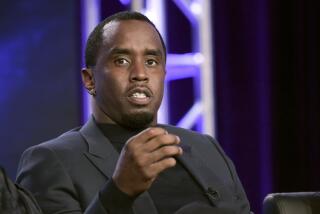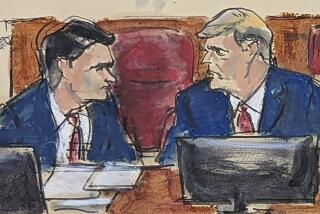Grand Jury Selection to Start in Jackson Case
- Share via
SANTA BARBARA — County prosecutors will begin picking members of a secret grand jury Thursday to decide whether there is enough evidence against pop star Michael Jackson to take his child molestation case to trial, sources close to the case said Tuesday.
The grand jury could take up to two weeks to hear testimony from witnesses. Among them will be the 14-year-old former cancer patient allegedly molested by Jackson during the early months of last year at the entertainer’s Neverland Ranch in Santa Barbara County’s Santa Ynez Valley.
Sources told The Times that in addition to allowing the prosecution to preview witness credibility without public scrutiny, the decision by Dist. Atty. Tom Sneddon to avoid a public preliminary hearing would allow the young alleged victim in the case and possibly some members of the boy’s family to tell their stories sooner rather than face delays that could stretch for months.
“This was always the prosecution choice,” one source said. “This way Sneddon gets to test his case in privacy without a lot of media hoopla. He can avoid tipping the defense lawyers to the prosecution’s total strategy. And it has the added benefit of letting the family get this over with fast.”
The setting initially shifts from the small courthouse in Santa Maria, where all other Jackson legal proceedings and any future trial are set, to the palatial County Courthouse in downtown Santa Barbara. Modeled after a Spanish-Moorish castle, the building is one of the city’s leading tourist draws and has been called one of the most spectacular courthouses in the nation.
But the courthouse could be only the first stop for the grand jury. Prosecutors are considering moving the jurors periodically to minimize media coverage, sources said. They said some grand jury sessions might even be held elsewhere in the city or county. “It is going to be a game of hide and seek for at least a week or two,” one source said.
“That’s almost obsessive,” said Loyola Law School professor Laurie Levenson. “There is a need to preserve grand jury privacy, but I’ve never seen such obsessive efforts before.”
Jackson, 45, was charged in December with seven felony counts of child molestation and two counts of providing an intoxicant to a minor with the intent of molesting him. He has been free on $3-million bail. An April 2 hearing has been set to schedule a preliminary hearing, and the actual trial is not expected until December at the earliest.
In addition to the 14-year-old boy, a leukemia patient whose disease is now in remission, some key witnesses from a 1993 child molestation probe of Jackson that ended in a secret multimillion-dollar settlement are also expected to testify, the sources said. Among them probably will be the alleged victim in that case, who is now 24, one source said.
“This is a good opportunity for the prosecution to see the testimony of people who may or may not be friendly to them,” said Jack Earley, a defense lawyer who has handled several high-profile Santa Barbara County cases and serves as president of the California Attorneys for Criminal Justice. “It’s pretty much a free fishing expedition for them. If grand jury witnesses refuse to testify, they can be jailed for civil contempt.”
A gag order imposed on all parties by Superior Court Judge Rodney S. Melville has blocked any comment by prosecutors or defense lawyers in the case. But former Santa Barbara County Sheriff Jim Thomas, a close Sneddon associate now covering the case as an NBC analyst, said his understanding was that Sneddon had always planned to go to a grand jury.
“He feels real good about the case,” said Thomas, who was sheriff during the 1993 child molestation probe of Jackson that ended in the out-of court settlement. “I believe the grand jury has been in the plans all along.”
Jackson, who has described the charges against him as a “big lie” concocted to extort another large settlement from him, has been invited by prosecutors to testify to the grand jury, but legal experts said there was no chance he would do so.
A tax lien was filed against the multimillionaire earlier this month by the California Franchise Tax Board, The Times learned. The state claims that Jackson owes $233,039 for late payments on an initial tax bill of about $2.6 million for the tax years of 1995 and 1997, although he has paid more than $3.2 million to the state on his taxes, back interest and penalties for those years.
Pat Hill, a spokesman for the state tax board, said Tuesday that the lien was a “passive collection tool” typically filed at the end of a lengthy collection effort. Hill said it presented no immediate financial issue, but simply would be in place if there were any attempt to sell property.
Charles Koppelman, Jackson’s senior financial advisor in New York, said the tax lien, issued March 5 and filed publicly in Santa Barbara on March 12, already was being dealt with and said it was a “nonissue.” He called it a matter that “just fell through the cracks” and said Jackson’s finances remained solid.
Attorneys for Jackson, meanwhile, have been busy this week with legal counteroffensives in state and federal court in Los Angeles.
More to Read
Sign up for Essential California
The most important California stories and recommendations in your inbox every morning.
You may occasionally receive promotional content from the Los Angeles Times.













